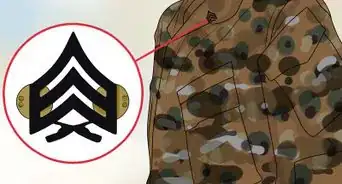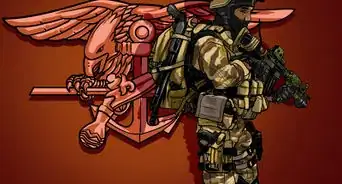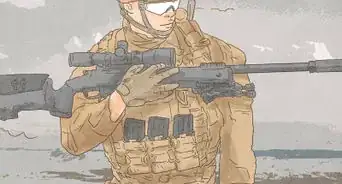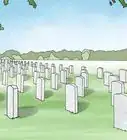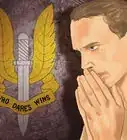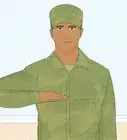wikiHow is a “wiki,” similar to Wikipedia, which means that many of our articles are co-written by multiple authors. To create this article, 21 people, some anonymous, worked to edit and improve it over time.
This article has been viewed 133,849 times.
Learn more...
The salute is a sign of respect, thought to date back to Roman times or medieval Europe.[1] In the UK, saluting the Armed Forces is considered a mark of tradition for individuals within the Armed Forces.
Steps
Doing the Royal Air Force and Army Salute
-
1Understand the salute is done on the behalf of the King. When an officer salutes another officer in the UK Armed Forces, he is in effect saluting His Majesty the King. So, if a subordinate airman salutes an officer, the officer will return the salute on behalf of the King.
-
2Salute with your right hand and an open palm. Officers in the Royal Air Force and the Army both salute the same way. When RAF and Army personnel do a hand salute, they display an open hand. They position their right hand so their fingertips almost touch the band of their hat.
- The RAF and the Army do not wear white gloves as part of their uniform, so they will salute with their palm facing forward.
Advertisement -
3Acknowledge your superiors with a salute. Taking the word “salute” literally, it is a way of offering a salutation or a greeting. In the military, you must show respect by saluting your superiors, and your superiors must reciprocate by saluting you.
- If you are not sure who is your superior officer based on your rank, you can use this chart here to determine who you should be saluting in the RAF and the Army. In the RAF, a Corporal will always salute an Air Marshal, for example, and in the Army a Private will always salute a Major.
-
1Understand the origins of the Navy salute. In the 1800s, naval officers would salute by raising their cap or by touching the brim of their cap with their index finger and thumb. This became the standard Navy salute, done with the right hand. The salute was done with the hand at a diagonal to prevent exposing the palm, as naval officers did not want to show their tar-stained hands to their superiors.[2]
- In the Navy, officers can salute with their left hand if their right hand is engaged or occupied.
-
2Salute with your right hand and your palm facing down, towards your shoulder. Make sure your forearm and hand stay in a straight line. Tilt your hand so your palm does not show as you salute. Keep your hand to the side of your face, just below your cap.[3]
-
3Acknowledge your superiors with a salute. The word “salute” means to offer a salutation or a greeting. In the military, you must show respect by saluting your superiors, and your superiors must reciprocate by saluting you.
- If you are not sure who is your superior officer based on your rank, you can use this chart here to determine who you should be saluting in the Navy. For example, in the Navy, a Petty Officer will always salute a Lieutenant.
Community Q&A
-
QuestionWhat is the position of a military salute?
 Community AnswerThe position is standing upright with arm bent up and hand to the forehead.
Community AnswerThe position is standing upright with arm bent up and hand to the forehead. -
QuestionWhat British regiment salutes left handed?
 Community AnswerNone. Every regiment in the army salutes with the right hand, same in the air force and royal marines.
Community AnswerNone. Every regiment in the army salutes with the right hand, same in the air force and royal marines. -
QuestionWhich service is senior when saluting in the UK armed forces?
 Community AnswerRoyal Navy. However, the most senior officer regardless of branch should be the person saluted.
Community AnswerRoyal Navy. However, the most senior officer regardless of branch should be the person saluted.
References
About This Article
To salute the UK Royal Air Force or Army, you’ll want to raise your right hand to your right temple with your palm facing forward and your fingers together. This is used to greet your superiors and show your respect. To salute superiors in the Navy, raise your right hand to your right temple, but keep your palm facing down. Make sure your elbow is in line with your hand. Like the Royal Air Force and Army, the Navy salute is used to demonstrate respect for your superiors. For more tips, including how to work out which ranks you should salute in the UK armed forces, read on!
-Step-1-Version-2.webp)
-Step-2-Version-2.webp)
-Step-3-Version-2.webp)
-Step-4-Version-3.webp)
-Step-5-Version-3.webp)
-Step-6-Version-3.webp)
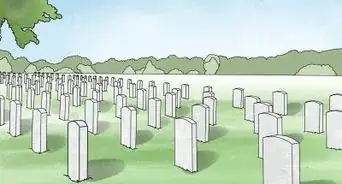

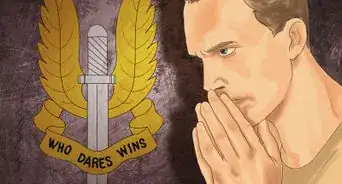


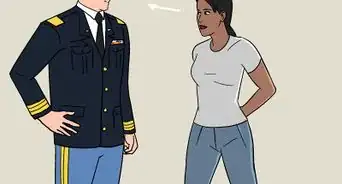
-Step-10-Version-3.webp)


